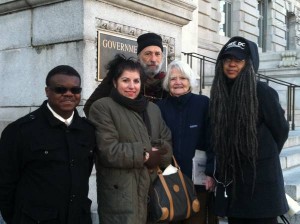
From l to r: Jean-Louis Peta Ilkambana, Mai Abdul Rahman, David Schwartzman, Mary Harding, Anise Jenkins
Listen to the report card contributors:
Audio clip: Adobe Flash Player (version 9 or above) is required to play this audio clip. Download the latest version here. You also need to have JavaScript enabled in your browser.
In 2008, the D.C. Council declared the District of Columbia the first Human Rights City in the U.S. On a chilly morning last week on the steps of the John A. Wilson Building, several local activists issued a 36-page report card which concluded, “the District has a long way to go toward achieving the promise of its declaration.”
“For somebody who came here from a country where human rights violations are things that we see on a daily basis, I was really shocked to see that D.C. residents were being pushed out of their houses because of financial issues,” said report contributor Jean-Louis Peta Ilkambana of the American Friends Service Committee. “I always see people in front of my own office seeking shelter. I said, ‘What is this? Am I back home or I’m in Washington, D.C.?'” asked Ilkambana, who’s originally from the Democratic Republic of Congo.
In addition to receiving an F for “Access to affordable housing and ending homelessness,” D.C. also received a failing grade for “Poverty reduction and income inequality.”
“The top one percent, the millionaires, are paying an overall tax rate that is equal to the poorest residents,” explained Statehood Green Party activist and Howard University professor David Schwartzman. “While the working and middle class families are paying 9-10 percent of their income, the millionaires are paying a little less than 7 percent. They could do better,” said Schwartzman, who contributed to the report.
The District also received a failing grade for “Welfare of children.” “There [isn’t] enough family shelter housing,” contributor Mai Abdul Rahman told TheFightBack. While the District has recently experienced an increase in the number of homeless children, “there are no real services that address their needs,” said Rahman.
Among D.C.’s better grades was a B+ for “Promotion of self-determination and statehood for DC.” Last year, Mayor Vincent Gray and six sitting council members went to jail for protesting congressional interference over how the District spend its own tax dollars.
The report issued an F to the federal government, in part because “it has continued to fail to recognize D.C. residents as American citizens,” said contributor Anise Jenkins, executive director of Stand Up for Democracy. “We’re a unique, and unfortunately unique, place to live.”
